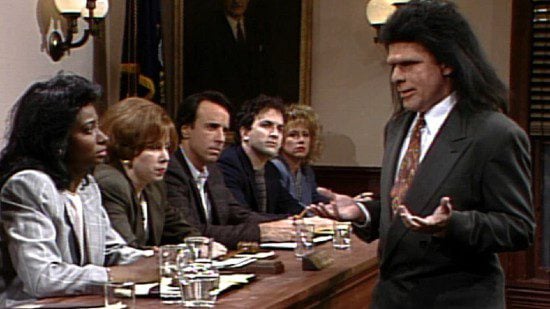It's a well-established fact that vampires can't abide crosses. There seems to be some confusion, however, as to why this is so.
 I should note here, before we go on, that I believe in vampire stories. I don't mean that I believe these stories are "literally" true — they're not that kind of story. But I believe they are true stories — stories by which we tell ourselves true things so that we do not forget them.
I should note here, before we go on, that I believe in vampire stories. I don't mean that I believe these stories are "literally" true — they're not that kind of story. But I believe they are true stories — stories by which we tell ourselves true things so that we do not forget them.
Vampire stories tell us, for example, that any of us can have great power if only we are willing to prey on others. Feed off the blood of others and great power will be yours. This is demonstrably true. It's how the pyramids were built. And Standard Oil.
The stories also tell us that there's a downside to this predatory choice. You become a creature of the night, unable to stand in the light of day.
And crosses will confound you.
Some mistakenly think that this is because the cross is a holy symbol, imbued with religious power. But this is wrong. The symbol, like the thing itself, is powerless. And that's the point. That is why vampires can't tolerate it.
Most vampires don't believe in the cross, but that hardly matters. It's the idea of the thing that gives them fits. The cross confronts vampires with their opposite — with the rejection of power and its single-minded pursuit. It suggests that no one is to be treated as prey — not even an enemy. The idea of the cross, in other words, suggests that vampires have it wrong, that they have it backwards, in fact, and that those others they regard as prey are actually, somehow, winning.
This notion is incomprehensible for vampires. The one thing they're certain of, the thing that drives them and tells them who they are and how the world works and that they've got it all figured out is that the key to immortality is in choosing to be the predator rather than the prey. The idea that this might be wrong is so befuddling, so contradictory to everything they have chosen to be that it forces them to recoil. They can't get past it.
It has become fashionable in modern vampire stories to portray these monsters as unaffected or somehow immune to the cross. Don't you believe it. This confusion arose due to the ridiculous, contradictorily cruciform objects being bandied about these days as "crosses." A filigreed gold or bejeweled cross refutes itself, denying its own representation of powerlessness. Likewise the oxymoronic martial crosses — a problem since at least the time of Constantine — that attempt to present themselves as sanctified symbols of power. Crosses like that aren't the least bit disturbing to a vampire — they merely proclaim vampirism by other means. Vampires have been known, in fact, to have such crosses emblazoned on flags, or even to have tattoos of them etched into their undead flesh.
So the apparent immunity of modern vampires to such crosses isn't what it seems. Sacrificial powerlessness still confounds them, but that idea is no longer quite so effectively signified by this particular symbol. I've heard rumor of a vampire not so long ago being turned away by one of Margaret Bourke-White's photographs of Gandhi at his spinning wheel. Fortunately I have not had the occasion, personally, to attempt to repeat this experiment.
As for garlic, well, I'm not really sure what that is supposed to tell us, but I'm open to theories.
(What brings all this up, by the way, is that I've just finished reading Jeff Sharlet's excellent book, The Family: The Secret Fundamentalism at the Heart of American Power. The central figure in that book, Doug Coe, is absolutely a vampire.)
















